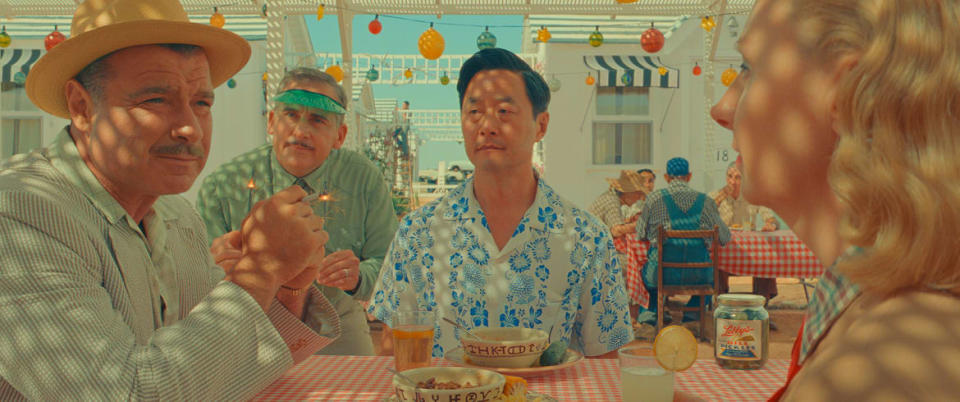‘Asteroid City’: Wes Anderson’s Alien-Invasion Movie Is Delightfully Brilliant

- Oops!Something went wrong.Please try again later.
- Oops!Something went wrong.Please try again later.
- Oops!Something went wrong.Please try again later.
On the internet these days, Wes Anderson is less director than trend. TikTokers make “Wes Anderson”-inspired videos of their own life. Thanks to A.I., I’ve been subjected to Harry Potter in the style of “Wes Anderson” and Star Wars in the style of “Wes Anderson.” But the actual, human Wes Anderson’s latest film Asteroid City proves that it’s really impossible to recreate Wes Anderson unless you are in fact Wes Anderson. Want Wes Anderson to make an alien movie? Don't turn to some computer program to do that. The man did it himself.
Asteroid City has all of the ticks that make Anderson Anderson: The slow pans, the deliberate framing, the erudite dialogue, and a narrator to boot. It’s also his best film since 2014’s The Grand Budapest Hotel, a thoroughly hilarious piece that coalesces into something almost haunting. Asteroid City is thick with Americana, but the charming hootenanny of it all works in tandem with the deep questions the director is asking.
First: the framing device. We immediately learn that what we are watching is a television broadcast about a play called Asteroid City, which we are told never actually existed, hosted by a besuited man with the air of a Rod Serling-type played by Bryan Cranston. Filmed in black and white and Academy ratio, these segments offer a behind-the-scenes look at the process of putting up the production composed by Conrad Earp (Edward Norton), a celebrated playwright with a Southern twang. When Anderson cuts to the action of the play within the movie, the frame expands and the picture brightens into the gorgeously saturated light of the American West.
The play “Asteroid City” follows a group of families and other visitors who descend on this tiny outpost in the middle of nowhere, that was once the site of a meteoric event, for the 1955 celebration of the Junior Stargazer honorees. Among those inventive teens is Woodrow Steenbeck (Jake Ryan), whose father, Augie (Jason Schwartzman), is a hardened war photographer. He has shrapnel in his head, never asks permission to take a photo, and his photos always come out.
Augie’s wife and Woodrow’s mother has recently died, a fact that Augie has waited weeks to divulge to his shy son and his three mischievous sisters, who think they are witches. Augie is jaded and Woodrow is awkward, which makes them, respectively, perfect matches for vain, overly dramatic movie star Midge Campbell (Scarlett Johansson, never better) and her sarcastic daughter Dinah (Grace Edwards).
In typical Anderson fashion, this foursome just scratches the surface of the array of characters who have descended on Asteroid City. There is a honky tonk band led by Rupert Friend and a schoolteacher played by Maya Hawke, trying to wrangle a bunch of curious kids. Tom Hanks rolls up as Augie’s cantankerous (and occasionally randy) father in law, Stanley Zak, while Tilda Swinton is on hand as a daffy scientist and Jeffrey Wright as a self-serious general.
During a nighttime event where the Asteroid City tourists are encouraged to put a cardboard box on their heads to observe an astral phenomenon, the group is visited by a spindly alien with enormous eyes and lizard skin, who somewhat nervously tiptoes out of his spacecraft, steals the town's asteroid and flies away. Alexandre Desplat’s score swells as this impish creature enacts his heist under the green light of his vessel. The strange occurrence, brilliantly executed via puppetry, forces Asteroid City to go under lockdown, trapping the travelers.
‘May December’: Julianne Moore and Natalie Portman Are Phenomenal at Cannes
Anderson divides up the “Asteroid City” sections by acts and scenes, a constant reminder that what is unfolding is fake within the world of the film. The documentary sections, meanwhile, introduce the audience to the actors playing the likes of Midge and Augie as well as the production’s director (Adrien Brody), a tortured creative going through a divorce.
It would be tempting to see the meta scaffolding of Asteroid City as just more Andersonian quirk, but there’s something intentionally unsettling about the way the film unfolds. The reminder that the denizens of “Asteroid City” are actually actors gnaws at the viewer. The desert-set portions are not shot as if they were on a theater’s stage, but instead exist in a liminal space between fiction and reality.
The screenplay is one of Anderson’s funniest, and yet a darker thread courses through it. That’s in part thanks to the exploration of death that comes with the Augie-Woodrow plotline, but there's also something more existential at play. Though it’s hard to say whether the pandemic and lockdowns were Anderson’s direct inspirations, if you pierce all of the perfect retro production design there’s a thoroughly timely fascination with paranoia and confinement and the notion of making art under those circumstances.

On one hand, you have the alien invasion plot where the characters are forced to ponder the secrets of the universe; on the other, there’s the play within a tv program within a movie in which the performers playing those characters attempt to figure out how to believably tap into that mystery. Both tap into the lore of America—one the dusty western settlement; the other the twinkle of Broadway and the great writers.
What none of the Anderson parodies get right is that despite all of his aesthetic tendencies, that style is always in service of something greater. In Asteroid City, his love of artifice is on full display, but that artifice is the point. Anderson has meticulously built a layered world. Peel back the constructs and you’ll find a melancholy that’s hard to shake.
Liked this review? Sign up to get our weekly See Skip newsletter every Tuesday and find out what new shows and movies are worth watching, and which aren’t.
Get the Daily Beast's biggest scoops and scandals delivered right to your inbox. Sign up now.
Stay informed and gain unlimited access to the Daily Beast's unmatched reporting. Subscribe now.

